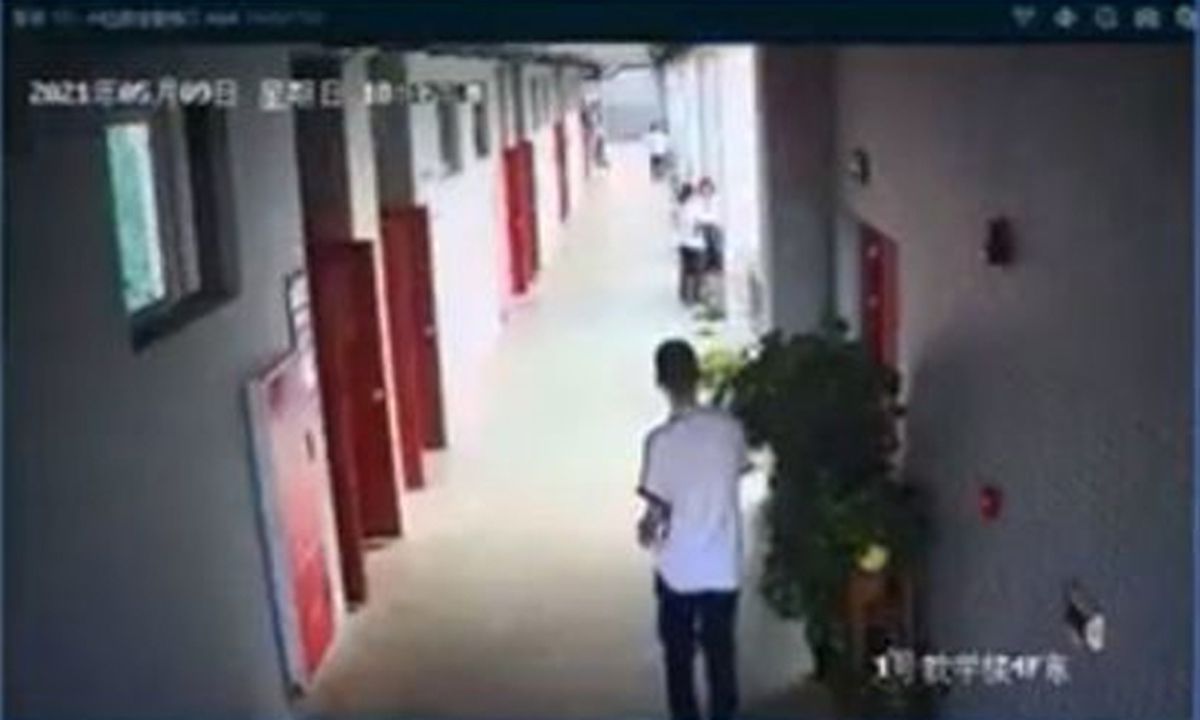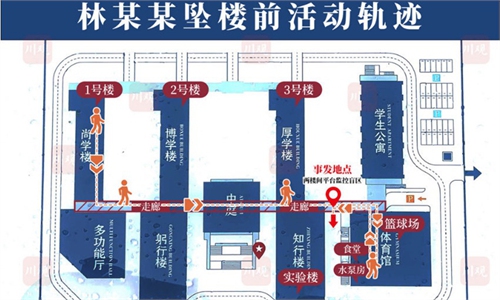Cyberspace complexity in spotlight as rumors over Chengdu student's tragic death quelled by probe

Surveillance footage shows Lin leaves his classroom on the 4th floor on Sunday at 6:16 pm. Photo: Media screenshot of surveillance video
Stormy public sentiment on Chinese social media returned to rationality on Thursday over the tragic death of a 16-year-old student in Southwest China's Sichuan Province after a comprehensive report and a live-streamed visit to the school by official media outlets cleared the rumors about the tragic event.
After ruling out the possibility of foul play, police revealed to the media that the student left a note to a female student, which seemed to coincide with previous speculation that the death may be related to puppy love, which also explained why the school was reluctant to disclose more details that might expose the private information of those involved.
The case, however, has left the Chinese public to reflect on the complexity of cyberspace and how a mixture of genuine and false opinions shapes social perceptions.
A student surnamed Lin, from the 49th High School of Chengdu, capital of Sichuan, fell to his death on campus on Sunday. The death stirred a huge online response as Lin's heartbroken mother took her protest to Sina Weibo, asking questions including why the school only informed her two hours after the incident, why the school refused to show her the complete surveillance footage, and why Lin's body was taken directly to a funeral parlor instead of a hospital.
A detailed Xinhua News Agency report cleared up online rumors and accusations by the mother one-by-one by releasing surveillance footage, on-site pictures and testimony, which dismissed the brewing online sentiment against the school and local authorities, whose response to the parents' grief and concerns had been seen as "insensitive," too brief and lacking in details.
It showed that not a single section of the footage of Lin's death at school had been left out. The school said it took some time for a teacher to identify Lin because of the severity of the injuries to Lin's head and that the teacher was in a state of emotional trauma.
The school did not arbitrarily take Lin's body to a funeral parlor - the truth is, that after a doctor pronounced the student dead on site, police delivered Lin's body to the funeral parlor in accordance with legal procedures.
Police also dismissed rumors from anonymous netizens on China's Quora-like Q&A platform Zhihu alleging that Lin had been pushed from the building by a chemistry teacher whose child was competing with him for a place to study abroad.
Another report by CCTV on Thursday afternoon added that Lin's parents had now agreed to have their son's body cremated. It also dismissed another rumor alleging that the school had asked students at Lin's school to remain silent.
Before the truth of the case surfaced on Monday, Chinese social media including Sina Weibo and Zhihu were filled with angry and unrational voices. Those voices, spurred by rumors and wild speculations, questioned the credibility of the official statements on the incident and launched attacks against the authorities. Intentional or not, the attacks helped brew antagonism between public and the government.
The thorough investigative reports on Thursday gave the public a true picture about why Lin ended up falling to his death from a high school building. Video showed that minutes before his death, Lin cut his left wrist with what is believed to be a knife.
Police said they found a knife beside Lin's body and later in Lin's personal belongings, a note to a female student.
The reports also stopped a lot of online rumors and unverified anonymous information from continuing to circulate online.
Some netizens claimed to be parents of Lin's classmate, fabricating lies and stirring up the public against the school and local government. Some online celebrities and "we-media" made eye-catching remarks and headlines to drive public sentiment.
Zhihu said the platform will spot false news spreaders and inform the police. The publicity department of Chengdu said that it had punished those who spread rumors and will issue a public notice later.
As online sentiment cooled on Thursday, it forced society to ask how those emotional online expressions had been able to replace rational and objective voices. The case revealed the complexity of China's cyberspace, which is filled with voices from various groups, observers said.
"Such complexity poses great tests for local authorities in dealing with social events, requiring them to run ahead of rumors before cyberspace creates a 'hotbed' for them," Zhang Yiwu, a professor of cultural studies at Peking University, told the Global Times on Thursday.
The best weapon against rumors and public doubts is transparency and facts, said Zhang. Authoritative information should be disclosed effectively and promptly to address public concerns and squeeze the space for rumors to spread, Zhang noted.
Observers also called on netizens to take responsibility for debunking rumors, advocating rationality and maintaining a clean cyberspace in similar cases to Lin's tragedy.



